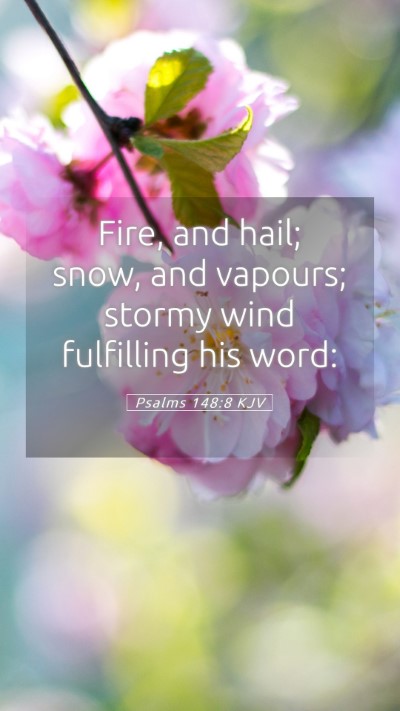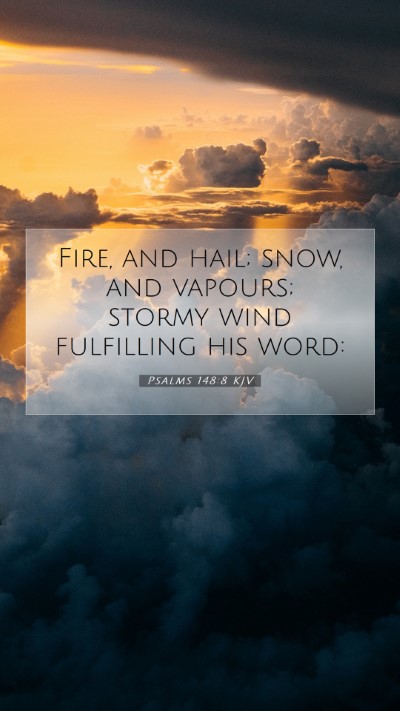Understanding Psalms 148:8
This study guide delves into the meanings and interpretations of Psalms 148:8, utilizing insights from noted public domain commentaries including those by Matthew Henry, Albert Barnes, and Adam Clarke. This verse reads:
"Fire, and hail; snow, and vapours; stormy wind fulfilling his word."
The verse extols various natural elements, attributing them to the fulfillment of God's will. Below, we explore the significance of each component thought through the lenses of different scholars.
Verse Breakdown and Meaning
- Fire
- Henry comments on fire as a symbol of both judgment and purifying presence.
- Barnes emphasizes its role in illustrating God's power over the forces of nature.
- Clarke mentions how fire represents divine zeal and the capacity for destruction.
- Hail
- Matthew Henry sees hail as a violent aspect of nature, reflecting the severe judgment of God.
- Albert Barnes notes that hail can serve to demonstrate God's sovereignty over the weather.
- Adam Clarke connects hail with divine displeasure, often sent as a means of chastisement.
- Snow
- Henry interprets snow as a symbol of grace and the cleansing nature of God’s mercy.
- Barnes views snow as an illustration of God’s provision and wonder in creation.
- Clarke highlights snow's representation of purity and the cooling effects amidst a fiery world.
- Vapours
- Henry suggests vapours demonstrate the mysterious and hidden workings of God in nature.
- Barnes indicates vapours play a role in God's cyclical nature of giving rain and growth.
- Clarke reflects on vapours as the divine hand bringing forth the waters that nourish the earth.
- Stormy Wind
- Matthew Henry describes storm winds as a force that can be both destructive and restorative.
- Barnes asserts that the wind serves to fulfill the purposes of God, both in creation and in judgment.
- Clarke emphasizes that winds are often portrayed as angels in the Bible, acting upon divine commands.
- Fulfilling His Word
- All commentators reflect on the completion of God’s desires through nature, reiterating the fact that even in storms and calm, all elements obey His command.
- This phrase summarizes the overarching theme of God’s sovereignty and omnipotence over creation.
Key Themes in Psalms 148:8
The overarching themes of this verse highlight:
- The Sovereignty of God: All creation is depicted as glorifying God by fulfilling His commands.
- Nature’s Obedience: The natural elements are personified as acting with intentionality in the execution of His will.
- Judgment and Grace: The juxtaposition of destructive forces and gentle ones signifies God's multidimensional nature.
Commentary Insights
By analyzing this verse through various commentaries, we uncover a rich tapestry of meanings that enhance its understanding:
- Matthew Henry: Emphasizes the association of natural disasters with divine will and the reminder of human vulnerability.
- Albert Barnes: Highlights the systematic order in the cosmos as a testament to divine authority.
- Adam Clarke: Focuses on the reassuring aspect of God’s control over nature, providing comfort in the face of storms.
Application of Psalms 148:8
This verse can be applied to daily life in several ways:
- Recognizing the beauty and power of nature as expressions of God’s will.
- Understanding that both trials (like storms) and blessings (like snow) are under God's control.
- Encouragement to trust in God’s overarching plan during turbulent times.
Cross References
This verse relates to several other scriptures, such as:
- Psalm 104:4 - God's use of wind and elements for His service.
- Job 38:22-23 - God's command over the storehouses of snow and hail.
- Isaiah 30:30 - God's voice present in storms and manifestations of greatness.
Conclusion
Psalms 148:8 offers profound insights into the relationship between God and His creation, showcasing His authority and the obedience of natural elements. The understanding of this verse enriches our personal Bible study journey, offering reflections that can be applied to everyday life.
As we delve into this Psalm, we invite further exploration through Bible study groups, online Bible study platforms, and resources to deepen our understanding of Scripture.


